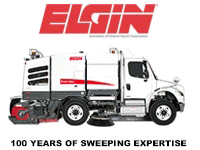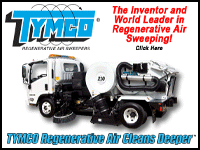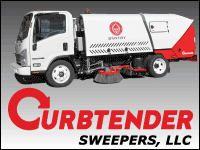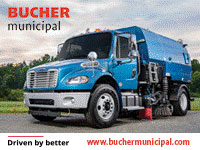 History tells us that sweeping was first started by Benjamin Franklin during his residence in London, England. When the cobblestone streets were dry, few people took the initiative to sweep up the dust, so it just built up. Eventually, when it rained, Franklin saw that the streets turned into an impassable, muddy mess, decided to do something about it. Sweeping of streets was born.
History tells us that sweeping was first started by Benjamin Franklin during his residence in London, England. When the cobblestone streets were dry, few people took the initiative to sweep up the dust, so it just built up. Eventually, when it rained, Franklin saw that the streets turned into an impassable, muddy mess, decided to do something about it. Sweeping of streets was born.
As time went on, sweeping the streets of 'road apples' from the horse-and-buggy days became increasingly important, especially as the health issues it posed became better understood. The impetus I had for starting the first magazine for sweeping in the early 1990s, American Sweeper, was my realization that public works directors/sweeping managers around the U.S. appeared to be pretending that horse poop was still the major debris they were tackling, not detritus from clutch plates, brake linings and from tire wear. At the same time, in those days prognosticators predicted that clean water would replace petroleum as the most problematic issue in coming decades. They were right: that time is now.
Now, 30+ years later, the industry faces a number of serious water-related issues: ChatGPT, perhaps the most well-known artificial intelligence program, estimates that a probable three million gallons of perfectly good water becomes polluted and dumped in the U.S. every day via usage in sweeper dust suppression systems. Some recent data has also shown that the efficiency of a street sweeper to perform small-micron debris pickup – including tire particles and other microplastics that are becoming so very important environmentally – is reduced when a sweeper uses water for dust suppression.
The only testing process in place currently is from the so called "PM-10 Certified" test conducted now decades ago by the South Coast Air Quality Management District (SCAQMD). That test has zero validity anymore since there is no mechanism in place for re-testing; manufacturers at the time found a way to get every make and model ever tested certified; and, it is only pass/fail and so there is no ranking of various make/model capabilities available to sweeper purchasers.
The recent study conducted by the City of Los Angeles found the Elgin Broom Bear it tested only removed @35% of the 'dirt simulant' used for the test; by contrast, Elgin's RegenX, a regenerative air machine, picked up in the 75% range. BTW, readers may recall that the studies in Florida and Minnesota found that sweepers were up to five times more cost-effective than any other method of picking up a pound of Nitrogen or Phosphorus, two of the most critical runoff pollutants. That was so even though neither of the testing agencies had enough industry experience to realize the value of separating the findings of broom sweepers from the results of the air sweepers.
Without needed data, way too many municipalities don't realize how compromised their stormwater runoff pollution programs are when they use current mechanical broom sweeper technology for sweeping city streets and other jurisdictions. They have no way of knowing how much better job an air sweeper would do with the average 20% of small-micron debris on a street that, for reasons of physics, may well contain up to 60% of the entire pollutant load. And, after that, how do the current crop of regenerative air and vacuum sweepers compare with each other in whatever the most important categories are to a particular jurisdiction's environment?
The point is, it's time to develop a sweeper testing process that 'hits all the bases.' With the intent of furthering that process, in our next issue we will have a Zoomcast dialogue between myself and Seth Brown, PE, PhD and Executive Director of the National Municipal Stormwater Alliance (NMSA). We will be discussing the needs of the stormwater community and how NMSA or an affiliate might be the ideal hosting agency for the development of a new national sweeper testing program. I envision this being done with input from the sweeper manufacturing community along with other invested industry players.
Such a comprehensive sweeper testing process – combined with updating sweeper-day vehicle removal via the technology I'll be discussing in my National Stormwater Awareness Week seminar this coming Friday – is the only way U.S. stormwater professionals can realistically determine what sweepers to buy and how often to sweep. Given the very positive data so far, that combined process will have the eventual result of increasing the use of street sweeping as a pollutant control method by a very significant amount.
As always, if you have questions and/or any news of potential interest to the power sweeping community, please let us know. Between this publication, the WorldSweeper.com website, and the World Sweeping Association, we'll be sure to get the information passed along to interested readers.
Good Sweeping,

Editor, WorldSweeper.com
Executive Director, World Sweeping Association
Member, PAVEMENT Hall of Fame
PS If you're a contractor I urge you to check out the many benefits of membership in the World Sweeping Association. Also, if you haven't 'liked' our WorldSweeper Facebook page, what are you waiting for? That's where we offer a variety of industry previews and updates on an ongoing basis.
September Newsletter Contents
(Scroll down to read stories or click on links below.)
- Stormwater Awareness Week Features Three Sweeper-related Seminars
- Walmart and Auditec: Trouble for Parking Area Sweeping Contractors
- Swedish Study on Sweeping Targets Micro Particle Pollution
- Current Overview of Electric Sweepers in the U.S.
- The Sweepers of Savusavu
Reminder: Stormwater Awareness Week Features Three Sweeper-Related Seminars












